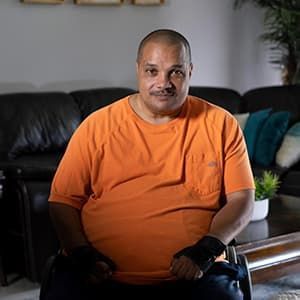
Harvey Brooks has turned a childhood accident into a lifetime passion.
“I broke my neck when I was 16, going on 17. I was about to be a senior in high school,” he said. “I was playing football and slipped on some wet grass and fell into the guy I was trying to tackle. It was devastating.”
Initially, Harvey couldn’t move anything.
“I didn’t know if I was ever going to be able to move again. But I had a lot of good family support, and that was important for me. Because, when you get a disability, a lot of people become depressed. And I wasn’t any different. But, because of my family support, I was able to overcome it.”
Harvey was able to regain some movement in his upper body, and has been using a wheelchair for the past 40 years. Now, he loves to travel, go to the beach, and hang out with his wife and son.
Inspired by the family support he got after his accident – and still has at home – he’s working to ensure other people living with disabilities can get that same support. And he’s doing that as the executive director of the Suncoast Center for Independent Living, in Sarasota, Florida.
“By having a disability such as the one that I have, I can relate to what (people who come to the center) are dealing with,” he said.
Suncoast offers people living with disabilities a variety of services, including medical equipment access, skills classes, peer mentoring and more.
“Our goal is to help our consumers be as independent as they can possibly be,” Harvey said.
Data from the Current Population Survey indicates that households with at least one person with a disability are at an increased risk of experiencing food insecurity. So, the center has also partnered with All Faiths Food Bank, a part of the Feeding America network of food banks, to offer food to visitors who may need it.
“If people can’t get to us, we’ll deliver the food to them,” Harvey said. “People in the disability community often have trouble getting food. Because our consumers rely on their social security income for food, it makes it difficult to get the proper type of food so they can be healthy.”
Suncoast staff deliver food to people in the community who face challenges to getting to the program. The food program also provides culturally appropriate food to the disability community.
“We have a lot of people who are Hispanic and African American. So, we try to stay in that cultural mindset. For example, a lot of our Hispanic consumers love black beans, plantains and rice. So those are the kinds of things we try to give to people,” Harvey said.
While he knows living with a disability has its unique challenges, Harvey is also grateful to be a part of people’s journey to independence.
“That’s what we do. We help people become independent. If someone calls us to say, ‘the center has helped me become independent when I didn’t think I could be,’ that’s big for us. We know we’re achieving our goals, and so are they.”
